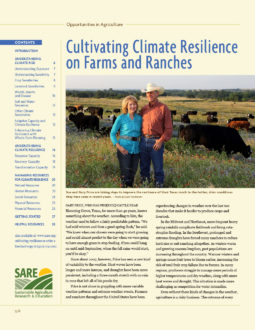There is mounting evidence that agriculture can play an important role in the effort to slow climate change. The Intergovernmental Panel on Climate Change estimates that agricultural soils have the potential to sequester from 4 percent to 12 percent of total annual global greenhouse gas emissions, and a recent study by the Rodale Institute estimated that up to 100 percent of annual global carbon dioxide emissions could be sequestered if all the world’s agricultural lands were transitioned to regenerative organic practices.
A recent review of climate solutions in California agriculture found that sustainable and organic farming can significantly reduce the carbon dioxide (CO2) emissions associated with crop and livestock production. For example: The substitution of nitrogen-fixing cover crops for purchased nitrogen fertilizers can reduce CO2 emissions by up to 50 percent; pasture-based beef production uses about 50 percent less energy than feedlot beef production; and organic production systems use about 25 percent less energy than comparable conventional systems.
Many sustainable agriculture practices offer win-win solutions to climate challenges because they both mitigate climatic changes and enhance climate resilience. Practices such as conservation tillage and no-till combined with cover crops or compost, diversified crop rotations, rotational grazing and agroforestry are particularly effective at pulling CO2 out of the atmosphere and storing it in the ground. Higher soil carbon content also enhances climate resilience on farms and ranches by enhancing soil health.
Farmers can also contribute to agricultural climate solutions in other ways: Choose suppliers who are committed to reducing emissions; participate in community-based mitigation programs; and adopt mitigation strategies on the farm or ranch when financially feasible. To learn more about these and other options for farmers and ranchers, see the National Sustainable Agriculture Information Service (ATTRA) publication, Agriculture, Climate Change and Carbon Sequestration and the SARE publication, Clean Energy Farming: Cutting Costs, Improving Efficiencies and Harnessing Renewables.
